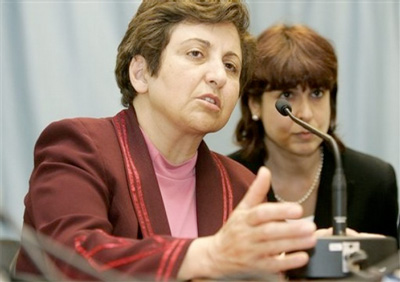
President Obama has promised to restore the United States’ moral authority in the world. In order to do so, the new administration should revise U.S. foreign policy that has proved a political failure and undermined respect for international human rights.
Topping the list is the U.S. policy of regime-change toward Iran. The policy has failed to bring any tangible changes in the Iranian regime’s behavior. Instead, the policy has harmed the Iranian people’s demands for the rule of law and respect for human rights.
Since December, Shirin Ebadi, the only Muslim woman ever to receive a Nobel Peace Prize, has been suffering at the hands of radical Islamists. Her office had been shut down, her clients’ documents have been confiscated, and radical Islamists have protested in front of her house, calling her “an American.”
The 2003 Nobel laureate has defended human rights victims and democratic values over the past two decades. She told me during a telephone interview that she believes that if she is killed, the perpetrator will never be identified.
When I asked her if she “would find (her) situation similar to (that of) politicians and intellectuals murdered 10 years ago in Iran,” she replied: “Yes, they are serious about what they are doing.”
The U.N. secretary general, international human rights organizations, the European Union and the Unites States have strongly condemned such harassment and asked the Iranian authorities to immediately stop such threats against Ebadi.
She incurred the government’s wrath when she announced a few weeks ago that a report represented by her center, the Center for Defenders of Human Rights, was the major comprehensive and reliable information source for the United Nations. The U.N. General Assembly followed this report with a resolution against the worsening human rights situation in Iran. Iran has banned entry of U.N. and international human rights inspectors and reporters since 2006.
Ebadi’s courageous activities in defense of human rights victims are an indication of Iran’s vibrant civil society; one which survives, despite repression. It also demonstrates how Iranian President Mahmoud Ahmadinejad fears his own people, particularly the moderate voices for change.
The worsening situation between the United States and Iran has given Ahmadinejad an open hand to suppress his critics and opponents more harshly than ever. The more confrontational the U.S. approach to Iran, the more excuses provided the Iranian government to suppress its people. Many Iranians, including Ebadi, believe the Bush administration’s strategy has played into the hands of Iran’s ruling ayatollahs.
A government that respects the rights of its own citizens will behave more responsibly and accountably internationally. This is what activists like Ebadi believe and fight for.
President Obama’s strategy of engaging Iran must directly address human rights concerns. So far, the United States has failed to establish any meaningful channels of dialogue with Iran. The new administration, harnessing full international support, should engage in full-fledged, but tough, negotiations with the Iranian authorities to address all issues of concern, including human rights.
Ebadi’s life and ability to continue her work, as well as the survival of Iranian civil society, are closely tied with the transition in U.S.-Iran relations. It is in the long-term interests of peace and security in the region to make sure moderate voices in Iran are not uprooted by radical elements.
Omid Memarian is a Rotary World Peace fellow at the UC Berkeley Graduate School of Journalism. This commentary was first published in the San Francisco Chronicle.






